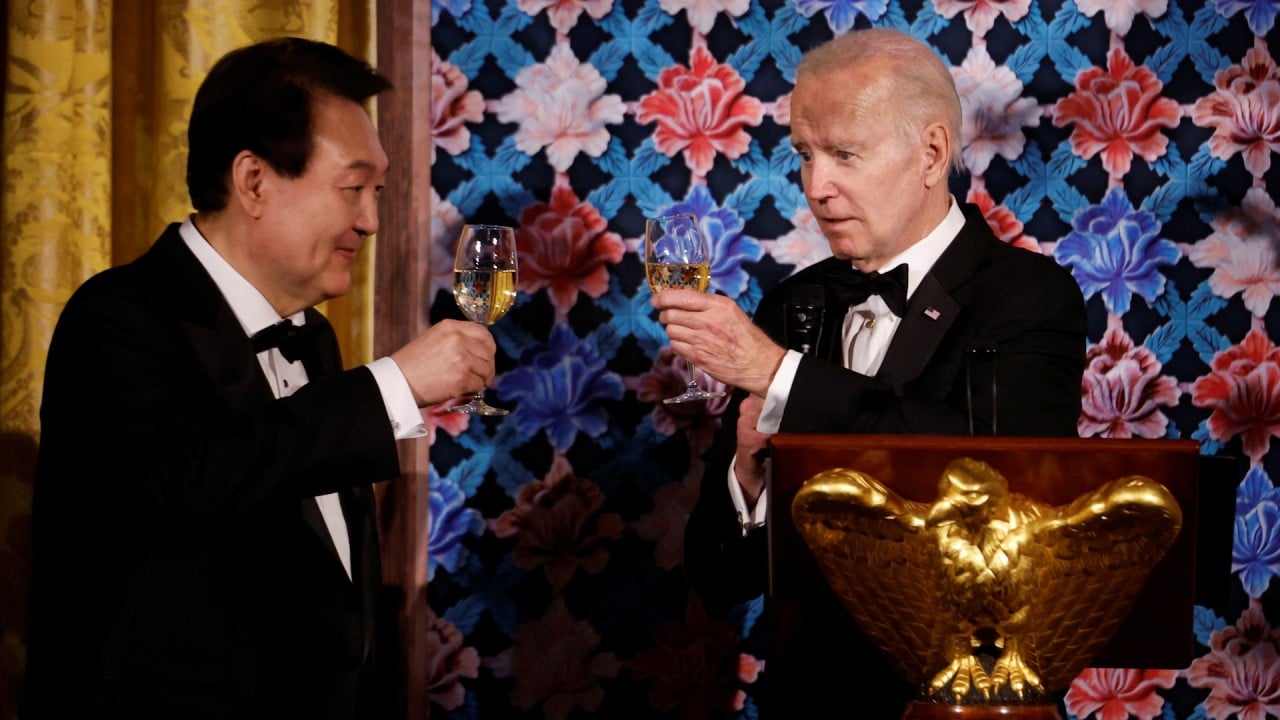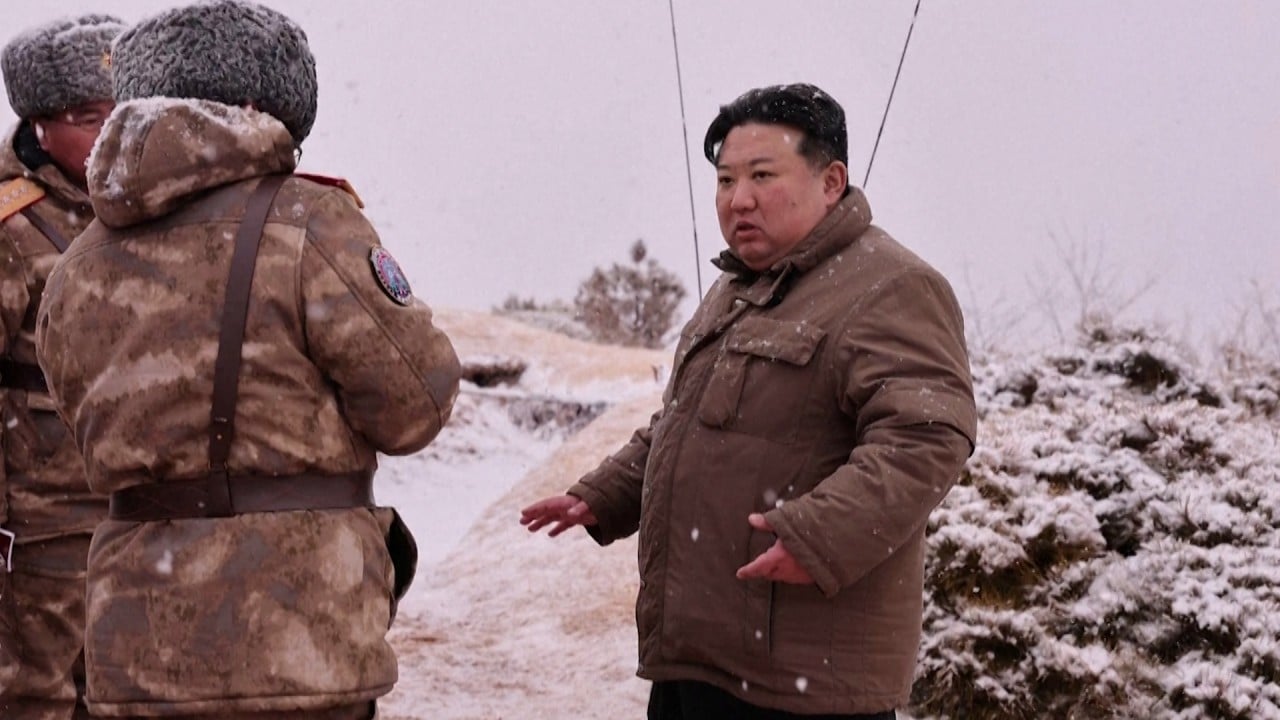Japanese Prime Minister Fumio Kishida’s priorities lie in the ongoing recovery from the severe Ishikawa earthquake in early January, and soothing public outrage over a corruption scandal involving his senior ministers that sent his approval ratings to a record low.
South Korean President Yoon Suk-yeol has been preoccupied with next month’s parliamentary election, widely seen as a prelude to the 2027 presidential poll. Failure to win back a parliamentary majority in the April vote would mean three more years of stagnation for Yoon’s People Power Party and his own presidency.
“China would like to see how resilient their leaderships would be, because if both leaders fall after the scandal or the election, China needs to reconfigure for new leadership styles in Japan and South Korea,” said Kei Koga, an associate professor with the Public Policy and Global Affairs programme at Singapore’s Nanyang Technological University.
Kishida is also set to visit the US next month when he and Biden will discuss efforts to “strengthen political, security, economic and people-to-people ties” to improve Indo-Pacific security. His administration is also focused on preparing for the trip, Koga said.
Zhu Zhiqun, professor of international relations and director of the China Institute at Bucknell University in Pennsylvania, said it was “no wonder” that Beijing wants to wait and see, given the political troubles of its neighbours.
“If Kishida and Yoon face domestic challenges, how firm are their commitments to improving relations with China? And it is unclear how they will be able to implement any agreement reached at the trilateral meeting,” Zhu said.
Besides the political challenges facing its regional neighbours, experts said that the US remains the “elephant in the room” looming over the trilateral relationship, with China wary about the growing strategic coordination between Washington, Tokyo and Seoul.
Beijing grew more concerned after the trilateral summit between the US, Japan and South Korea at Camp David last August, when the three leaders touted the gathering as the dawn of a new era in their close security partnerships.
Why China sees the Camp David summit as start of de facto military alliance
Why China sees the Camp David summit as start of de facto military alliance
The Camp David meeting produced plans for a long-term calendar of trilateral military exercises and for annual gatherings of leaders and ministers.
The summit also developed initiatives to protect supply chain security, denounced China for “dangerous and aggressive behaviour” in the South China Sea, and advocated for the status quo in the Taiwan Strait.
Analysts said that the warmer security ties between Tokyo, Seoul and Washington taking shape on China’s doorstep have caused Beijing to become more cautious about a regional leaders’ summit.
Zhang Yilun, a research associate at the Washington-based Institute for China-America Studies (ICAS), said the security-oriented partnerships are likely to trigger Beijing’s long-standing grievance over the US-led alliance-based approach towards Indo-Pacific security issues.
US to deploy 5 aircraft carriers in western Pacific in show of strength to China
US to deploy 5 aircraft carriers in western Pacific in show of strength to China
The fact that US-Japan-South Korea trilateral relations “unprecedentedly strengthened” at Camp David was particularly worrisome for China, Koga said, as they showed the determination of the three nations to maintain current international rules and norms, some of which China seems to be challenging.
Tokyo and Seoul may prefer to hold a leaders’ summit sooner rather than later, since it would provide a better chance for the leaders to identify viable areas of cooperation “no matter how slim that chance would be”, Koga said.
Zhu from Bucknell University agreed, adding that any diplomatic success for Kishida and Yoon from earlier high-level talks would help improve their political footing.
He noted, however, that Chinese leaders were in a relatively stronger position compared to their counterparts from Japan and South Korea, as the two leaders struggle with their domestic troubles.
“China is not interested in helping to boost Kishida’s and Yoon’s support at home. If Japan and South Korea have nothing substantive to offer to China, China is less incentivised to attend a trilateral meeting now,” Zhu said.
Still, Zhang believed Kishida and Yoon could accept a summit later in the year if they sensed that a fruitless earlier meeting would send the wrong message to the region and the world.
“Holding the summit now will only produce two possible outcomes: tangible outcomes that are too small to change anything, or an impasse that undermines confidence of the very platform itself,” Zhang added.
If a summit eventually materialises, experts think the leaders would push to boost trade, economic integration and people-to-people exchanges, while North Korea’s frequent missile provocations would be likely to be discussed.
They also been hinted at possible talks to restart a long-awaited free-trade pact between East Asia’s three main economies, but such a pact would be daunting and the summit itself would be unlikely to generate a meaningful boost in trilateral relations.
Even if the summit is revived, Zhang, from the ICAS, said it would be unrealistic to expect “any game-changing improvements” for the trilateral relationship, as China and the US remain entangled in a great power competition.
Washington is reducing room for nations who merely seek security protection while trying to preserve economic cooperation with China, he said.
“Without a clear path as to how the US-China competition is going to unfold, Japan and South Korea will only align with the US’ current approach to the region, which China will largely disagree with,” Zhang said.
While Japan and South Korea are US strategic allies, their trade reliance remains firmly on China, their largest trading partner.
China-US rift looms over Japan, South Korea as Beijing wants to restart trade
China-US rift looms over Japan, South Korea as Beijing wants to restart trade
According to the Japan External Trade Organization, trade volume between China and Japan in December was more than US$300 million, while trade volume between the US and Japan was about US$227 million.
According to Chinese figures, total trade with Japan in 2023 was US$318 billion, with trade volume between South Korea and China at nearly US$311 billion.
Bucknell’s Zhu said Beijing would prefer that Tokyo and Seoul not blindly follow Washington in formulating a united front in countering China, but rather “exercise some strategic autonomy”.
“In the US-China rivalry, Japan and South Korea may not necessarily always agree with the US. So there is room for China-Japan and China-South Korea cooperation as well as trilateral cooperation if the summit is held,” Zhu said.
Source: scmp.com






